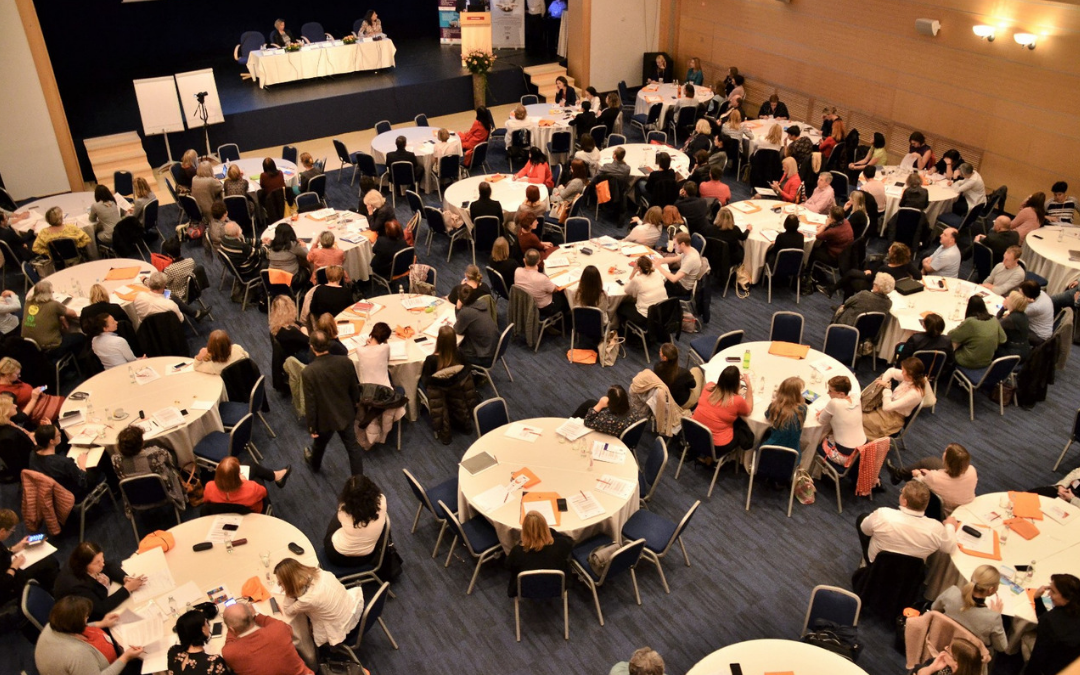The Annual Adult Education Conference that was held on 23 and 24 October in Maribor intertwined interesting topics with three outstanding pinnacles. The first one was delivered by Dr Vesna Vuk Godina who gave an impressive lecture about knowledge as the greatest value. During the second one we were nicely lulled in the evening by Ditka and Gorazd Čepin with Feri Lainšček. The third pinnacle event was a panel on the integration of elderly men into the community. The extensive programme and informative speakers were aptly maneuvered by Zvonka Pangerc Pahernik, MSc.
The starting point for further development steps in the field of Adult Education in Slovenia were through their own presentations shown by Elvira Šušmelj (MESS), Andrej Sotošek, MSc (SIAE) and Elido Bandelj (CPI). The foundation for change was set by the Adult Education Act (2018). It stipulates the reorganisation of the Adult Elementary School programme and the development of publicly accepted programmes which was the main topic of the consultation, divided into the plenary and working part and reports of the 1st and 2nd Working Group. They touched on national and global challenges, connecting with employers, changes occurring both on the labour market and due to the ageing population.
The follow-up was built on this theoretical base. A fresh approach, engaging of the audience through the VoxVote application, has given the speakers interesting cues. Nonetheless, this is anonymous voting, therefore in a sense it replaced the possibility of a debate.
In the afternoon part of the first day of the consultation, we first listened to an interesting case of good practice. More than twelve partners cooperate in the Promotion, animation and learning help project, while the Consortium is divided into West Slovenia with four and East Slovenia with eight partners. Nova Gorica School Centre named their part of the project PanUp, and Novo mesto School Centre named their part Atena. Within the context of the project, numerous promotional and entertainment projects will be implemented, while the most hours will be devoted to learning help which is a welcome (new) activity for many participants in adult education. People should be constantly encouraged to engage in activities, which are good for them. The CMEPIUS co-workers are also aware of this. At the consultation, they presented some historical information, statistics on previous involvement in the international exchange and data on the types of activities. Everything occurring in this field can be monitored through the EPALE platform.
The plenary part of the presentation of renovation of the Adult Elementary School programme and development (new) publicly accepted programmes was followed by group work. The co-coordinators summarised that the group work supported the dilemmas of the working groups and opened some important topics that need to be taken into account in terms of renovation/changes.
In his address, the Minister of Education, Science and Sport Dr Jernej Pikalo pointed out the importance of education and lifelong learning. He confirmed that we are on the same wavelength. He continued by announcing the preparation of a new national Adult Education strategy.
The foundation of the Old Guys say yes to Community project, among other things, include findings that men in the third and fourth life period are less aware of the importance of lifelong learning. Slovenia participates in the EU Project with this title, therefore the invitation to participate in the presentation and panel was given to Dr Marta Gregorčič, who currently manages activities. During the panel discussion we heard that both the Ministry of Labour, Family, Social Affairs and Equal Opportunities as well as the Ministry of Agriculture, Forestry and Food are aware of the problem. At the Ormož AEC and Slovenska Bistrica AEC they make every effort to attract (older) men as well through the study circles and other activities.
Andrej Zorko, the representative of the Association of Free Trade Unions of Slovenia, pointed out the importance of employee education, for which they strive within the context of Strengthening the social dialogue together with the AEC. Only competent employees can really apply themselves.
This was followed by contributions from the representatives of the OECD. Andrew Bell talked about the coordination of skills policies in the digital world. Ben Game who cooperated with the representatives of the Slovenian organisations in Skills strategy for Slovenia, and he presented eight proposed recommendations that arise from the second phase of activities.
The final contributions related to the integration within the project EAAL. Zvonka Pangerc Pahernik, MSc, the coordinator of the project in Slovenia summarised the background, funding and associated key events in 2018 with EU initiative, called Upskilling Pathways. We heard brief presentations from two EAAL consulting events, organised by the SIAE in cooperation with Association of Educational and Guidance Centres of Slovenia and Society of organisations for adult education at Secondary Schools. Tanja Vilič Klenovšek, MA, presented outreach work from the point of view of the EU Council Recommendation of Upskilling Pathways. She highlighted various forms of outreach work and the conditions for its effectiveness and performance.
In her closing address, Katja Dovžak, MSc, emphasised that the MESS supports education and counselling (also) for adults who take part in secondary and higher vocational education. The measures that we implement in Slovenia correspond to the recommendations of the Upskilling Pathways. Further development steps, linked to validation at national level, are the task of SIAE and CPI.
On the website of Annual Adult Education Conference 2018 you can view videos of all programme sets.
We see Annual Consultation on Adult Education 2018 as a mission and vision. Where are we? Well on track. Decision makers and policy makers, educators, learners, employers and trade unions – the mutual cooperation and connecting are growing under the auspices of the ESF. Where are we headed? On the upskilling paths into a learning society. One that is aware that a decision for knowledge is always fruitful.
Ana Peklenik (ana.peklenik@acs.si), SIAE





